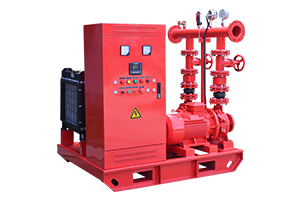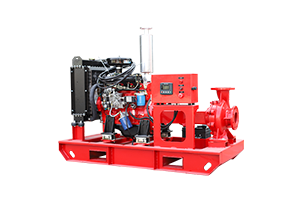-
 Oct 29, 2024What requires a fire pump?A fire pump is required in buildings and facilities where the water pressure from the municipal water supply or an on-site water source is insufficient for firefighting needs. Fire pumps are typically required by code in various high-risk or large structures to ensure adequate water flow and pressure for fire suppression systems. Here are some scenarios and structures where a fire pump is essential:
Oct 29, 2024What requires a fire pump?A fire pump is required in buildings and facilities where the water pressure from the municipal water supply or an on-site water source is insufficient for firefighting needs. Fire pumps are typically required by code in various high-risk or large structures to ensure adequate water flow and pressure for fire suppression systems. Here are some scenarios and structures where a fire pump is essential:
View details -
 Oct 28, 2024Are Diesel Fire Pumps More Effective for Heavy-Duty Applications?Yes, diesel fire pumps are generally more effective for heavy-duty applications due to their high power and reliability in scenarios where electricity supply may be compromised. Diesel engines can handle larger pump loads and sustain higher performance levels over long periods, making them ideal for demanding environments such as industrial plants, high-rise buildings, and remote areas where electricity may not be available or stable.
Oct 28, 2024Are Diesel Fire Pumps More Effective for Heavy-Duty Applications?Yes, diesel fire pumps are generally more effective for heavy-duty applications due to their high power and reliability in scenarios where electricity supply may be compromised. Diesel engines can handle larger pump loads and sustain higher performance levels over long periods, making them ideal for demanding environments such as industrial plants, high-rise buildings, and remote areas where electricity may not be available or stable.
View details -
 Oct 28, 2024Are Electric Fire Pumps More Suitable for Urban Areas?Yes, electric fire pumps are generally more suitable for urban areas due to several key factors:
Oct 28, 2024Are Electric Fire Pumps More Suitable for Urban Areas?Yes, electric fire pumps are generally more suitable for urban areas due to several key factors:
View details -
 Oct 25, 2024Are Electric Fire Pumps More Cost-Effective in the Long Run?Yes, electric fire pumps can be more cost-effective in the long run for several reasons:
Oct 25, 2024Are Electric Fire Pumps More Cost-Effective in the Long Run?Yes, electric fire pumps can be more cost-effective in the long run for several reasons:
View details -
 Oct 25, 2024What is the Importance of Fire Pump Vibration Monitoring?Fire pump vibration monitoring is crucial for several reasons:
Oct 25, 2024What is the Importance of Fire Pump Vibration Monitoring?Fire pump vibration monitoring is crucial for several reasons:
View details -
 Oct 24, 2024What Are the Best Practices for Fire Pump Motor Maintenance?Maintaining fire pump motors is crucial for ensuring their reliability and performance. Here are some best practices:
Oct 24, 2024What Are the Best Practices for Fire Pump Motor Maintenance?Maintaining fire pump motors is crucial for ensuring their reliability and performance. Here are some best practices:
View details






